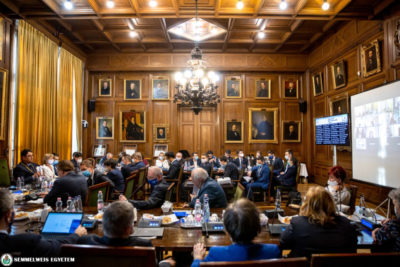The Senate adopted the Institutional Development Plan (IFT), which sets out the University’s strategy up to 2024. The main mission of Semmelweis University is to improve the health of citizens, to which the institution contributes through its high quality training, research and patient care activities, the document states.
The aim is to become an international leader, especially in the region, with the aim of becoming one of the five most successful medical universities in Europe by 2030 and one of the top 100 out of 28,000 universities in the world. The University’s mission for the period 2021-2024 is to build a university ecosystem that fosters innovation, research, patient care and development to achieve its strategic goals.
An important aspect in the preparation of the IFT was to ensure that it is in line with related documents, such as the Rector’s Program, the government’s proposal for model change, the objectives of the EU development period 2021-27 and the call for proposals “Reform of infrastructure, organisation and educational development of higher education institutions” (RRF). It also includes the university’s nearly 40 major development projects for the coming years.
The body also adopted the report on the University’s financial management for 2020, which was previously approved by the Board of Governors. Last year, the university exceeded the budgeted figures and the related tasks. Three major factors drove the management: meeting the challenges of COVID-19 care, the increase in tasks and performance due to the accession of the St. Roch Hospital, and the PPP replacement and transfer of the Basic Medical Science Center (EOK) to the University. In 2020, the original budget of the university was set at nearly HUF 96 billion, which, due to mid-year adjustments, was increased to HUF 175 billion, an increase of 22.7% compared to 2019. From a management point of view, the institution has fully fulfilled its basic tasks (education, research, health care).
The senators adopted the 2021 management budget, which has a total revenue of approximately HUF 156 billion and a total expenditure of HUF 161 billion. The planning is based on the principles of responsible, decentralized management and performance-based accounting, in line with the guidelines laid down earlier.
The focus of the budget is on supporting the University’s strategic objectives, such as the retention and development of human resources, support for research and development and innovation, improvement of the quality of equipment, property development and renovation, increase of operational efficiency, digitalization and IT development.
Two specific challenges for 2021 are also reflected in the budget: the continuing COVID-19 situation and the model change. The Consistory gave its preliminary agreement to the proposal.
 Amendments have been made to certain provisions of the Rules of Procedure on several issues. These include the creation of a Center for Translational Medicine to support the organizational background of research, development and innovation activities, which will be managed by the Rector with the assistance of the Vice-Rector for Science and Innovation. The creation of the post of Deputy Director-General for Economic Affairs has been included in the Staff Regulations. The Directorate for the Coordination of Financial Supervision of Vocational Training Institutions is abolished and its tasks are transferred to the Directorate for the Management of Vocational Training Institutions. In addition, the changes resulting from the introduction of the medical service have been introduced.
Amendments have been made to certain provisions of the Rules of Procedure on several issues. These include the creation of a Center for Translational Medicine to support the organizational background of research, development and innovation activities, which will be managed by the Rector with the assistance of the Vice-Rector for Science and Innovation. The creation of the post of Deputy Director-General for Economic Affairs has been included in the Staff Regulations. The Directorate for the Coordination of Financial Supervision of Vocational Training Institutions is abolished and its tasks are transferred to the Directorate for the Management of Vocational Training Institutions. In addition, the changes resulting from the introduction of the medical service have been introduced.
The body approved the self-evaluation of Semmelweis University prepared by the MAB (Hungarian Higher Education Accreditation Commission) in the framework of the institutional accreditation procedure, which, unlike before, had to be prepared at the level of the institution’s faculty rather than the department. A preparatory committee was set up under the direction of the Vice-Rector for Education and with the participation of the deans’ delegates of the faculties to draft the document, which is about 90 pages long.
The 2021 Program Strategy of the Semmelweis Science and Innovation Fund (STIA) was adopted. This year’s priority funding objectives of the STIA include internal proposals to promote innovation, support for the development of prototypes and experimental models based on university research results, and promoting participation in RDI programs and projects of high priority.
Amendments have been made to the Terms of Reference in relation to the rules governing the functioning of the Student Self-Government, which have resulted in the relevant provisions, which were previously in several places, being reproduced in one section. The amendment regulates the responsibilities of the Student Council and other student voluntary groups at the university in relation to events. The supervision of voluntary groups of Hungarian students will be carried out by the HÖK, while in the case of international student organizations this task will be assigned to the Vice-Rector for International Studies.
The body decided to introduce an optional 5-week additional clinical internship at the Faculty of Medicine. The course, which is available in three languages, can be taken by any medical student who has successfully completed the first ten semesters, but will also help students who would enter the UK residency training system to meet the changed requirements.
A motion was voted in favor of a technical amendment to 11 regulations to be adopted by the Senate in connection with changes to the structure of the health care system and the health service. It also amends the Financial Regulation, laying down the powers relating to the financial management of the Clinical Center, which is required by Government Decree No. 525/2020 (25.11.20).
The Senate decided on the award of a gold signet ring and also gave its opinion on current management and teaching posts.
It was decided to establish a Department of Emergency Medicine as of 1 May 2021. The new clinic will integrate the functions of the current Emergency Department (SBO), as well as educational and research activities related to patient care. The decision is in line with the aim to ensure that all disciplines are represented at the highest level in the university.
Pálma Dobozi
Translation: Tamás Deme
Photo (illustration): Attila Kovács – Semmelweis University


